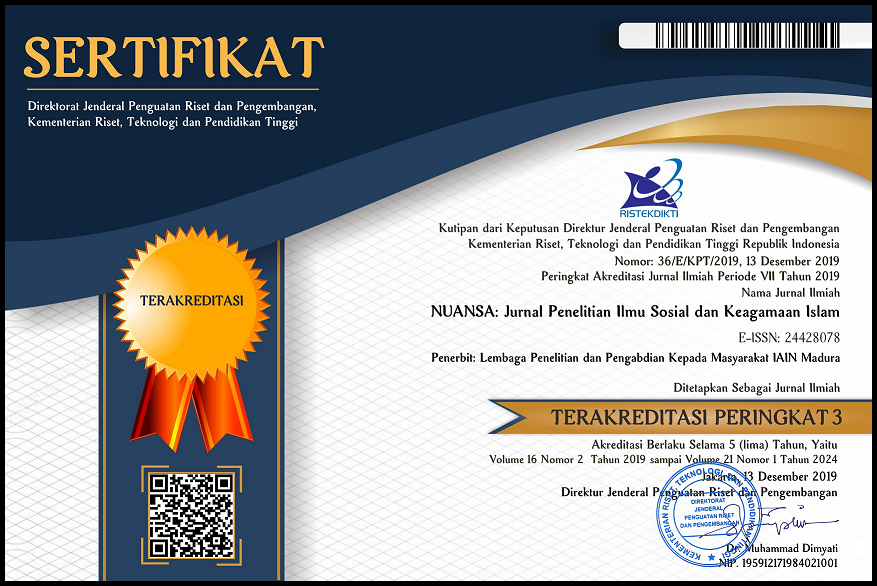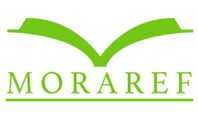Persepsi Masyarakat Terhadap Perilaku Prososial Siswa Kelas VIII di Madrasah Tsanawiyah Negeri 1 Bongkudai
 Abstract views: 694
,
Abstract views: 694
,
 PDF downloads: 652
PDF downloads: 652
Abstract
Dalam interaksi sosial masyarakat Timur lebih mementingkan kebersamaan yang harmonis dan didasari dengan kasih sayang. Karenanya seringkali masyarakat melakukan penilaian terhadap orang lain dan menyimpulkan karakteristik kepribadiannya. Oleh karena itu, perilaku prososial mencakup segala bentuk tindakan yang menguntungkan dan dilakukan untuk menolong orang lain, tanpa memperdulikan motif-motif penolong. Artikel ini bertujuan untuk mendeskripsikan Persepsi Masyarakat Bongkudai Terhadap Perilaku Prososial Siswa Kelas VIII Di MTs Negeri Bongkudai. Artikel ini menggunakan jenis penelitian kualitatif dengan pendekatan deskriptif. Hal ini dikarenakan data yang dikumpulkan adalah data yang di telaah secara sistematis mengenai fakta-fakta dan sifat populasi atau penelitian yang langsung dilakukan di lapangan (field research) sehingga peneliti mampu melihat bagaimana persepsi masyarakat terhadap perilaku prososial siswa. Hasil penelitian menunjukkan bahwa persepsi masyarakat Bongkudai berdasarkan pengalaman dan kedekatan mereka dengan siswa yang ada. Dimana mereka melihat siswa di MTs Negeri Bongkudai terutama kelas VIII memiliki perilaku prososial namun harus selalu diarahkan serta diberikan motivasi agar perilaku mereka menjadi sebuah perilaku yang baik. Terutama pada Aspek berbagi, menolong, jujur, dermawan, kerjasama. Kelima perilaku ini masih mempunyai kekurangan. Oleh karena itu masyarakat, guru dan orang tua perlu saling berkoordinasi dalam rangka meningkatkan perilaku prososial siswa.
(In social interaction, the East community emphasizes harmonious togetherness and is based on compassion. Therefore, people often make judgments about other people and infer their personality characteristics. Therefore, prosocial behavior includes all forms of action that are beneficial and done to help others, regardless of the motives of the helper. This article aims to describe the Perceptions of the Bongkudai Society against the Prosocial Behavior of Class VIII Students in MTs Negeri Bongkudai. This article uses a type of qualitative research with a descriptive approach. This is because the data collected is data that is systematically examined about the facts and nature of the population or direct research conducted in the field (field research) so that researchers are able to see how people's perceptions of student prosocial behavior. The results showed that the perception of the Bongkudai community was based on their experience and closeness with existing students. Where they see students in MTs Negeri Bongkudai especially in class VIII have prosocial behavior but must always be directed and motivated so that their behavior becomes a good behavior. Especially in aspects of sharing, helping, honest, generous, cooperation. These five behaviors still have flaws. Therefore the community, teachers, and parents need to coordinate with each other in order to improve students' prosocial behavior).
Downloads
References
Achmadi. Ideologi Pendidikan Islam: Paradigma Humanisme Teosentris. 1 ed. Yogyakarta: Pustaka Pelajar, 2005
Amato, Paul R. “Emotional Arousal and Helping Behavior in a Real-Life Emergency.” Journal of Applied Social Psychology 16, no. 7 (Oktober 1986): 633–641, DOI: 10.1111/j.1559-1816.1986.tb01164.x.
Dayakisni, dan Hudaniah. Psikologi Sosial. Malang: Universitas Muhammadiyah Malang Press, 2009
Dayakisni, Tri, dan Husdaniah. Psikologi Sosial (Edisi Revisi) Buku 1. Malang: UMM Press. Malang: UMM Press, 2006
Desmitha. Psikologi Perkembangan Peserta Didik. 6 ed. Bandung: Remaja Rosda Karya, 2016
Eisenberg, N. Handbook of Child Psychology. Sixth Edition. Volume Three: Social, Emotional, and Personality Development. New Jersey: John Wiley & Sons, Inc, 2006
Farida, Haniek. “Perilaku Prososial Ditinjau dari Androgyny Role dalam Kegiatan Pramuka Pada Anak Sekolah Dasar.” SOSIOHUMANIORA: Jurnal Ilmiah Ilmu Sosial Dan Humaniora 3, no. 2 (20 Oktober 2017): 113–126, DOI: 10.30738/sosio.v3i2.1610.
Febrianti, Thrisia, dan Mulawarman Mulawarman. “Peningkatan Perilaku Prososial Siswa Melalui Konseling Teman Sebaya Berbasis Kecakapan Hidup.” Indonesian Journal of Educational Counseling 3, no. 3 (5 Agustus 2019): 293–300, DOI: 10.30653/001.201933.113.
Khotim, Nilawatul. “Penerapan Bimbingan Kelompok Teknik Sosiodrama untuk Meningkatkan Perilaku Prososial Siswa Kelas X TKJ-1 (Teknik Komputer Jaringan 1) SMK Raden Rahmat Mojosari Mojokerto.” Jurnal BK UNESA 4, no. 3 (13 Agustus 2014): 641–649.
Laurens, Joyce Marcella. Arsitektur & Perilaku Manusia. 2 ed. Surabaya: PT Gramedia, 2005
Matondang, Elvrida Sandra. “Perilaku Prososial (Prosocial Behavior) Anak Usia Dini dan Pengelolaan Kelas melalui Pengelompokan Usia Rangkap (Multiage Grouping).” Eduhumaniora 8, no. 1 (Januari 2016): 34–47, DOI: 10.17509/eh.v8i1.5120.
Muhibib, Abdul Rahman Shaleh, dan Abdul Wahab. Psikologi Suatu Pengantar dalam Perpektif Islam. Jakarta: Kencana, 2004
Mulyasa, E. Kurikulum Berbasis Kompetensi (KBK) Konsep Karakteristik, dan Implementasi. Bandung: Remaja Rosdakara, 2005
Muniroh, Muniroh. “Pengaruh Layanan Bimbingan Kelompok Terhadap Perkembangan Perilaku Prososial Siswa.” ENLIGHTEN: Jurnal Bimbingan Konseling Islam 2, no. 2 (19 Desember 2019): 92–96, DOI: 10.32505/enlighten.v2i2.1347.
Murisal, Murisal. “Pengaruh Kelompok Teman Sebaya Terhadap Perilaku Konsumtif Pada Remaja Puteri.” Kafa`ah: Journal of Gender Studies 2, no. 2 (12 Juli 2012): 199–218, DOI: 10.15548/jk.v2i2.58.
Mussen, Paul Henry, John Janeway Conger, dan Jerome Kagan. Child Development and Personality. 5 ed. New York: Harper and Row Publishers, 1989.
Ningrum, Intan Kusuma. “Meningkatkan Perilaku Prososial Rendah Melalui Layanan Penguasaan Konten dengan Teknik Sosiodrama Pada Siswa Kelas VII SMP Negeri 21 Semarang Tahun Ajaran 2013/2014.” Skripsi, Fakultas Pendidikan Universitas Negeri Semarang, 2013
Novita, Kiftiyah Riris, Dwi Yuwono Puji Sugiharto, dan Catharina Tri Anni. “Meningkatkan Kemampuan Prososial Siswa Melalui Layanan Informasi Dengan Teknik Bibliotherapy.” Indonesian Journal of Guidance and Counseling: Theory and Application 6, no. 4 (29 Desember 2017): 42–49, DOI: 10.15294/ijgc.v6i4.18138.
Noya, Andris. “Hubungan Kecerdasan Emosi dan Perilaku Prososial Siswa di SMA Negeri 9 Halmahera Selatan.” Ciencias : Jurnal Penelitian dan Pengembangan Pendidikan 2, no. 1 (9 Januari 2019): 28–34.
Nurfirdaus, Nunu, dan Risnawati Risnawati. “Studi Tentang Pembentukan Kebiasaan Dan Perilaku Sosial Siswa (Studi Kasus Di SDN 1 Windujanten).” Jurnal Lensa Pendas 4, no. 1 (28 Februari 2019): 36–46, DOI: 10.33222/jlp.v4i1.486.
Papalia, Diane E., dan Ruth Duskin Feldman. Menyelami Perkembangan Manusia. Jakarta: Salemba Humanika, 2014
Rahman, Agus Abdul. Psikologi Sosial. Jakarta: Raja Grafindo Persada, 2014
Razak, Alifah Indalika Mulyadi, dan Agus Ruswandi. “Shared Reading: Solusi Perilaku Prososial Pada Kelompok Anak Usia Mixed-Age Groups.” EduChild: Majalah Ilmiah Pendidikan 3, no. 1 (7 Agustus 2019): 1–14.
Sears, David O., Jonathan L. Fredman, dan Letitia Anne Peplau. Social Psychology. 5 edition. New Jersey: Prentice-Hall, 1994
Sukmadinata, Nana. Metode Penelitian Pendidikan. 1 ed. Bandung: PT Remaja Rosadakarya, 2005
Susanto, Ahmad. Bimbingan dan Konseling di Sekolah: Konsep, Teori, dan Aplikasinya. Jakarta: Kencana, 2018
Syah, Muhibbin. Telaah Singkat Perkembangan Peserta Didik. Jakarta: Rajawali Pers, 2014
Yusuf, Putri Maharani, dan Ika Febrian Kristiana. “Hubungan Antara Regulasi Emosi dengan Perilaku Prososial Pada Siswa Sekolah Menengah Atas.” Empati 6, no. 3 (5 Maret 2018): 98–104
The journal operates an Open Access policy under a Creative Commons Attribution-NonCommercial 4.0 International License (CC-BY-NC) 
Authors who publish with this journal agree to the following terms:
- Authors retain copyright and grant the journal right of first publication with the work simultaneously licensed under a Creative Commons Attribution License that allows others to share the work with an acknowledgement of the work's authorship and initial publication in this journal.
- Authors are able to enter into separate, additional contractual arrangements for the non-exclusive distribution of the journal's published version of the work (e.g., post it to an institutional repository or publish it in a book), with an acknowledgement of its initial publication in this journal.
- Authors are permitted and encouraged to post their work online (e.g., in institutional repositories or on their website) prior to and during the submission process, as it can lead to productive exchanges, as well as earlier and greater citation of published work.





















